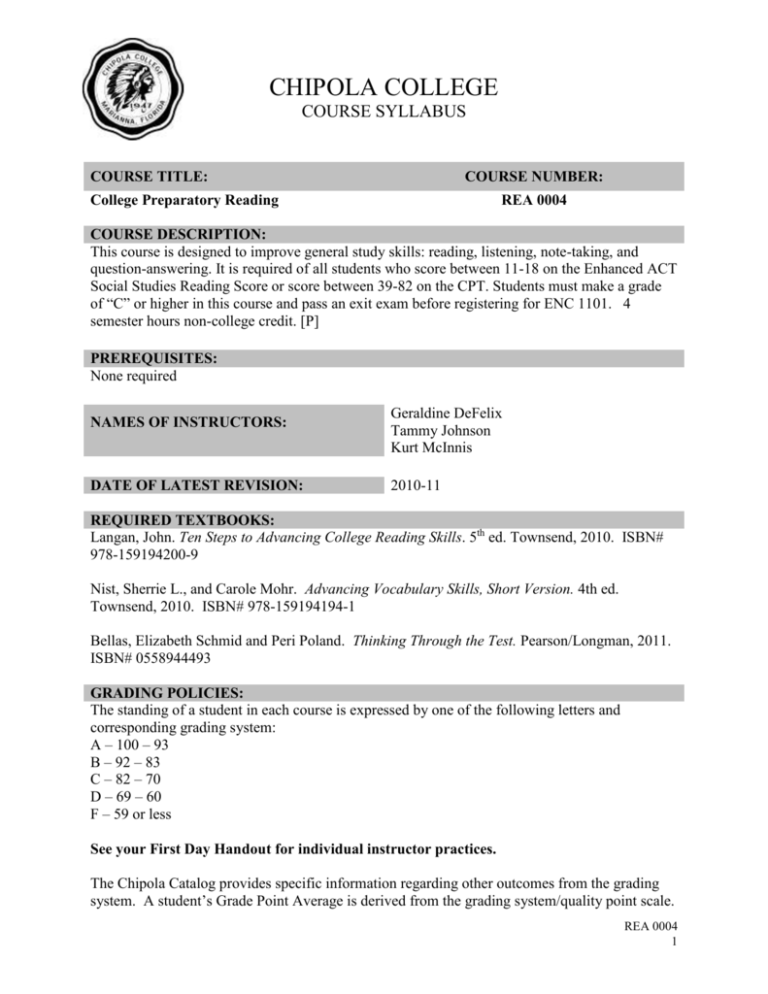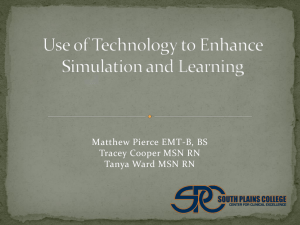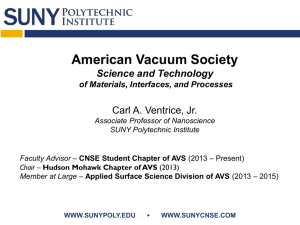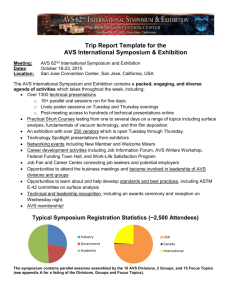
CHIPOLA COLLEGE
COURSE SYLLABUS
COURSE TITLE:
COURSE NUMBER:
College Preparatory Reading
REA 0004
COURSE DESCRIPTION:
This course is designed to improve general study skills: reading, listening, note-taking, and
question-answering. It is required of all students who score between 11-18 on the Enhanced ACT
Social Studies Reading Score or score between 39-82 on the CPT. Students must make a grade
of “C” or higher in this course and pass an exit exam before registering for ENC 1101. 4
semester hours non-college credit. [P]
PREREQUISITES:
None required
NAMES OF INSTRUCTORS:
DATE OF LATEST REVISION:
Geraldine DeFelix
Tammy Johnson
Kurt McInnis
2010-11
REQUIRED TEXTBOOKS:
Langan, John. Ten Steps to Advancing College Reading Skills. 5th ed. Townsend, 2010. ISBN#
978-159194200-9
Nist, Sherrie L., and Carole Mohr. Advancing Vocabulary Skills, Short Version. 4th ed.
Townsend, 2010. ISBN# 978-159194194-1
Bellas, Elizabeth Schmid and Peri Poland. Thinking Through the Test. Pearson/Longman, 2011.
ISBN# 0558944493
GRADING POLICIES:
The standing of a student in each course is expressed by one of the following letters and
corresponding grading system:
A – 100 – 93
B – 92 – 83
C – 82 – 70
D – 69 – 60
F – 59 or less
See your First Day Handout for individual instructor practices.
The Chipola Catalog provides specific information regarding other outcomes from the grading
system. A student’s Grade Point Average is derived from the grading system/quality point scale.
REA 0004
1
EXIT TEST POLICY
Through HB 1545, the 1997 Florida Legislature made passing an exit exam a condition
for meeting basic college communication skills requirements. As a result of this legislation, all
students enrolled in college preparatory classes beginning with the fall semester of 1999 must
successfully complete the exit exam in addition to the coursework in the college preparatory
classes. These students may not enroll in college credit English courses until they meet the
exit exam and college preparatory class requirements within the same grading period.
The reading exit exam will be administered during a regular class period prior to the end
of the semester. Only those students who fail the exit exam will be allowed to retake it at the
time designated on the final exam schedule.
A grade of at least 60 is required for successful completion of the reading exit exam. The
exit exam will be counted as the final exam for REA 0004 and will be averaged into the overall
grade as such. Note: Remember that in addition to making at least a 60 on the exit exam, a
student must also have at least a 70/C average for the coursework in all college prep
communications classes to be allowed to enroll in college credit communications courses.
Makeup policy: Students who miss the first testing session with the permission of your
instructor may take the exit exam during the retake session scheduled during Final Exams Week.
DISCIPLINE SPECIFIC COMMUNICATIONS COMPETENCIES / LEARNING
OUTCOMES: For college credit courses
See chart, last page
STUDENT LEARNING OUTCOMES/OBJECTIVES FOR REA 0004:
See chart, last page
MEANS OF ACCOMPLISHING OUTCOMES:
The student will
1. read all material assigned in the syllabus unless otherwise indicated by the instructor.
2. work on his or her areas of weakness. The instructor may assign special work to help the
student eliminate any weaknesses.
3. obtain a passing score on pop quizzes, weekly quizzes, exercise, and/or announced tests.
Assignments turned in late will be docked five points for each day late, unless prior
arrangements have been made with the instructor.
The instructor will
1. conduct class in an orderly and efficient manner. All of each class period will be
composed of a recognizable part of the subject matter of the course, relating to one or
more the course objectives. The instructor is expected to be the expert on this content of
the course and is further expected to assist the student in mastering this content. In order
to do this, the instructor will discuss the assigned material and will carefully evaluate all
written or oral work used in determining grades.
LIBRARY AND ON-LINE REFERENCE MATERIALS:
The library is a comprehensive, learning resource center providing information in print,
REA 0004
2
electronic, and multimedia format to support the educational objectives of the College. In
addition to print media, online catalogs and resources can be accessed through
www.linccweb.org and www.netlibrary.com. Library hours are posted each semester at the
building entrance.
Chipola’s website is located at www.chipola.edu
For additional developmental English assistance, student can access an online English source,
found on the English/Letters Department webpage.
See your First Day Handout for individual instructor recommendations and resources.
TECHNOLOGY RESOURCES:
The Information Technology Center, located in the library, is equipped with computer
workstations. Lab hours are posted each semester at the building entrance.
ASSIGNMENT SCHEDULE:
TENTATIVE WEEKLY ASSIGNMENTS: See your First Day Handout for individual instructor
assignment schedule. Online practice sites will be suggested by your instructor as necessary.
WEEK 1: Orientation
Ten Steps: “Introduction,” Chapter 1, pp. 3-13
Advancing Voc. Skills: “Introduction,” pp. 1-6; Chapter 1, pp. 8-11
MyReadingLab Assignment: ______________________________
WEEK 2: TEST: AVS: Chapter 1
Ten Steps: Part One, Chapter 1: “Vocabulary in Context,” pp. 17-54
Thinking Through the Test (TTT): “Word Choice: Context Clues,” pp. 87-96
AVS: Chapter 2, pp. 12-15
MyReadingLab Assignment: ______________________________
OnCourse Activity: _______________________________________
WEEK 3: TESTS: AVS: Chapter 2; Ten Steps: “Vocabulary In Context”
Ten Steps: Chapter 2: “Main Ideas,” pp. 55-102
TTT: “The Main Idea,” pp. 21- 30
AVS: Chapter 3, 16-19
MyReadingLab Assignment: ______________________________
WEEK 4: TESTS: AVS: Chapter 3; Ten Steps: “Main Ideas”
Ten Steps: Chapter 3: “Supporting Details,” pp. 103-142
TTT: “Supporting Details,” pp. 30-37
AVS: Chapter 4, pp. 20-23
MyReadingLab Assignment: ______________________________
OnCourse Activity: _______________________________________
WEEK 5: TESTS: AVS: Chapter 4; Ten Steps: Chapter 3: “Supporting Details”
Ten Steps: Chapter 4: “Implied Main Ideas,” pp. 143-180
TTT: Review pp. 23-25
AVS: Chapter 5, pp. 24-27
REA 0004
3
MyReadingLab Assignment: ______________________________
WEEK 6: TESTS: AVS: Chapter 5; Ten Steps: “Implied Main Ideas”
Ten Steps: Chapter 5: “Relationships I,” pp. 181-228
TTT: “Patterns of Organization,” pp. 50-65
AVS: Unit One: Review & Tests 1-4, pp. 28-36; Chapter 6, pp. 38-41
MyReadingLab Assignment: ______________________________
OnCourse Activity: _______________________________________
WEEK 7: TESTS: AVS: Chapter 6; Ten Steps: “Relationships I”
Ten Steps: Chapter 6: “Relationships II,” pp. 229-282
TTT: “Relationships Within a Sentence,” pp. 66-76 and
“Relationships Between Sentences,” pp. 76-86
AVS: Chapter 7, pp. 42-45
MyReadingLab Assignment: ______________________________
WEEK 8: TESTS: AVS: Chapter 7; Ten Steps: Chapter 6: “Relationships II”
Ten Steps: Chapter 7: “Inferences,” pp. 283-328
TTT: “Inferences and Conclusions,” pp. 123-138
AVS: Chapter 8, pp. 46-49
MyReadingLab Assignment: ______________________________
OnCourse Activity: _______________________________________
WEEK 9: TESTS: AVS: Chapter 8; Ten Steps: Chapter 7: “Inferences,”
Ten Steps: Chapter 8: “Purpose and Tone,” pp. 329-370
TTT: “Biased Language,” pp. 96-105 and “Author’s Tone,” pp. 106-116
AVS: Chapter 9, pp. 50-53
MyReadingLab Assignment: ______________________________
WEEK 10: TESTS: AVS: Chapter 9; Ten Steps: Chapter 8: “Purpose and Tone”
Ten Steps: Chapter 9: “Argument,” pp. 371-410
TTT: “Assessing Support for Reasoning and Argument,” pp. 138-146
AVS: Chapter 10, pp. 54-57
MyReadingLab Assignment: ______________________________
OnCourse Activity: _______________________________________
WEEK 11: TESTS: AVS: Chapter 10; Ten Steps: Chapter 9: “Argument”
Ten Steps: Chapter 10: “Critical Reading,” pp. 411-456
TTT: “Fact and Opinion,” pp. 117-124
AVS: Unit Two: Review & Tests 1-4, pp.58-66; Chapter 11, pp. 68-71
MyReadingLab Assignment: ______________________________
WEEK 12: TESTS: AVS: Chapter 11; Ten Steps: Chapter 10: “Critical Reading”
Ten Steps: Part II Chapters as assigned by instructor, pp. 459-574
TTT: “Test-Taking Strategies,” pp. 343-348
AVS: Chapter 12, pp. 72-75
MyReadingLab Assignment: ______________________________
OnCourse Activity: _______________________________________
REA 0004
4
WEEK 13: TESTS: AVS: Chapter 12
Ten Steps: Part III, “Combined-Skills Tests,” pp. 577-617
TTT: “Exit Exams—Reading,” (Practice) pp. 357-365
AVS: Chapter 13, pp. 76-79
MyReadingLab Assignment: ______________________________
WEEK 14: TESTS: AVS: Chapter 13
REVIEW FOR STATE EXIT EXAM
TTT: “Exit Exams—Reading,” (Practice) pp. 365-381
AVS: Chapter 14, pp. 80-83
MyReadingLab Assignment: ______________________________
WEEK 15: TESTS: AVS: Chapter 14
EXIT EXAM
Additional readings with practice tests if necessary for retakes—online practice
exercises may also be suggested.
AVS: Chapter 15, pp. 84-87; Unit Three: Review & Tests 1-4, pp. 88-96
Advancing Voc. Skills: Final Exam—Ch. 1-15
EXIT EXAM RETAKES (if necessary)
ATTENDANCE AND WITHDRAWAL POLICIES:
Regular attendance is expected of all students. Each student is accountable to the instructor for
all class absences. There are three acceptable excuses for absences: (1) severe illness, (2) death in the
immediate family, and (3) official college activity (approved by Student Services). Any questionable
excuse shall be verified by the office of Student Services when requested by the instructor.
When any absence occurs, it is the responsibility of the student to contact the instructor as soon as
possible and make arrangements about making up work. Work must be made up within one week
following the absence or within the time specified by the instructor in case of extended absence. A
ten-point penalty is assessed for late work. Except as noted above, make-up work will not be permitted
after the one-week deadline, and the instructor will record a grade of “0” for each assignment not
submitted.
Tardiness to class is disruptive to learning and is unacceptable. If the student is tardy, the student
shall see his/her instructor at the end of the class period, and the instructor will determine if the tardiness
is excusable. Excessive tardiness may be counted as absences at the discretion of the instructor.
A student may withdraw from a course prior to the deadline for withdrawing which is listed in the
college catalog and the college class schedule. A student who has missed too many classes or who is
making unsatisfactory progress in the course can withdraw and receive a “W” mark for the course. It is
the student’s responsibility to obtain the necessary request form from the Registrar’s Office for
withdrawing from a class, to obtain signatures for completing it, and to turn it in to the Registrar’s Office
before the deadline. It is advisable to check later to ensure that the withdrawal has been processed.
NOTE: In 1997, the Florida Legislature passed House Bill 1545 which requires that students who
have enrolled more than two times in the same college preparatory (non-credit) course must pay tuition
fees at 100% of the full cost of instruction. The full cost of instruction is the same as the non-resident
tuition fee. All Florida community colleges and state universities are required to begin “counting”
attempts beginning in the Fall term 1997. An “attempt” is any course which remains on the student’s
class schedule past the published drop/add date for any academic term. When a student withdraws from a
REA 0004
5
course, the withdrawal counts as an attempt; therefore, if a student enrolls in the same college preparatory
course for the third time, he will pay the non-resident tuition fee. A student is allowed to repeat a course
a maximum of three (3) times. On the third attempt, a student cannot withdraw; he must receive a
grade. After the third attempt at college preparatory classes, a student cannot continue in college-credit
courses.
MAKE-UP POLICY:
See Attendance Policy (above)
ACADEMIC HONOR CODE POLICY:
Students are expected to uphold the Academic Honor Code. Chipola College’s Honor Code is
based on the premise that each student has the responsibility to
1) uphold the highest standards of academic honesty in his/her own work;
2) refuse to tolerate academic dishonesty in the college community; and
3) foster a high sense of honor and social responsibility on the part of students.
Further information regarding the Academic Honor Code may be found in the Chipola Catalog,
Student Governance section.
STUDENTS WITH DISABILITIES POLICY:
Chipola College is committed to making all programs and facilities accessible to anyone with a
disability. Chipola’s goal is for students to obtain maximum benefit from their educational
experience and to effectively transition into the college environment.
Students with disabilities are requested to voluntarily contact the Office of Students with
Disabilities to complete the intake process and determine their eligibility for reasonable
accommodations.
LINKING COURSE, DISCIPLINE, AND GENERAL EDUCATION COMPETENCIES
COURSE-LEVEL STUDENT LEARNING OUTCOMES
FOR REA 0004
The student will learn the following:
Identify the stated or implied main idea
DISCIPLINESPECIFIC
GENERAL
EDUCATION
COMPETIENCIES
C-2, C-3
Recognize supporting details
C-2, C-3
Determine author’s purpose
C-2, C-3, C-6
Detect bias
C-2, C-3,
C-6, C-7,
SS-11
C-2, C-6,
C-7, SS-11
C-2, C-6,
C-7, SS-11
C-2, C-6,
C-7, SS-11
Determine the denotative and/or connotative meanings of words
in context
Distinguish between fact and opinion
Draw logical inferences and conclusions
ASSESSMENT
METHODS USED
BY FACULTY**
CA/P, HA, P,
CE, CSEE
CA/P, HA, P,
CE, CSEE
CA/P, HA, P,
CE, CSEE
CA/P, HA, P,
CE, CSEE
CA/P, HA, P,
CE, CSEE
CA/P, HA, P,
CE CSEE
CA/P, HA, P,
CE, CSEE
REA 0004
6
COURSE-LEVEL STUDENT LEARNING OUTCOMES
FOR REA 0004
The student will learn the following:
Identify organizational patterns
Evaluate valid arguments
DISCIPLINESPECIFIC
GENERAL
EDUCATION
COMPETIENCIES
C-2, C-3
Recognize relationships between sentences
C-2, C-4,C-6,
C-7, SS-9,
SS-10, SS-11
C-2, C-6,
C-7, SS-11
C-2, C-3, C-6
Recognize relationships within a sentence
C-2, C-3, C-6
Recognize tone
ASSESSMENT
METHODS USED
BY FACULTY**
CA/P, HA, P,
CE, CSEE
CA/P, HA, P,
CE, CSEE
CA/P, HA, P,
CE, CSEE
CA/P, HA, P,
CE, CSEE
CA/P, HA, P,
CA/P, CE,
CSEE
**Assessment Codes
CA/P = Class Attendance/Participation
HA = Homework Assignments
CE = Chapter Exams
P = Projects
CSE = Comprehensive State Exit Exam
For a list of Chipola’s College –Level Competencies, see www.chipola.edu
REA 0004
7




